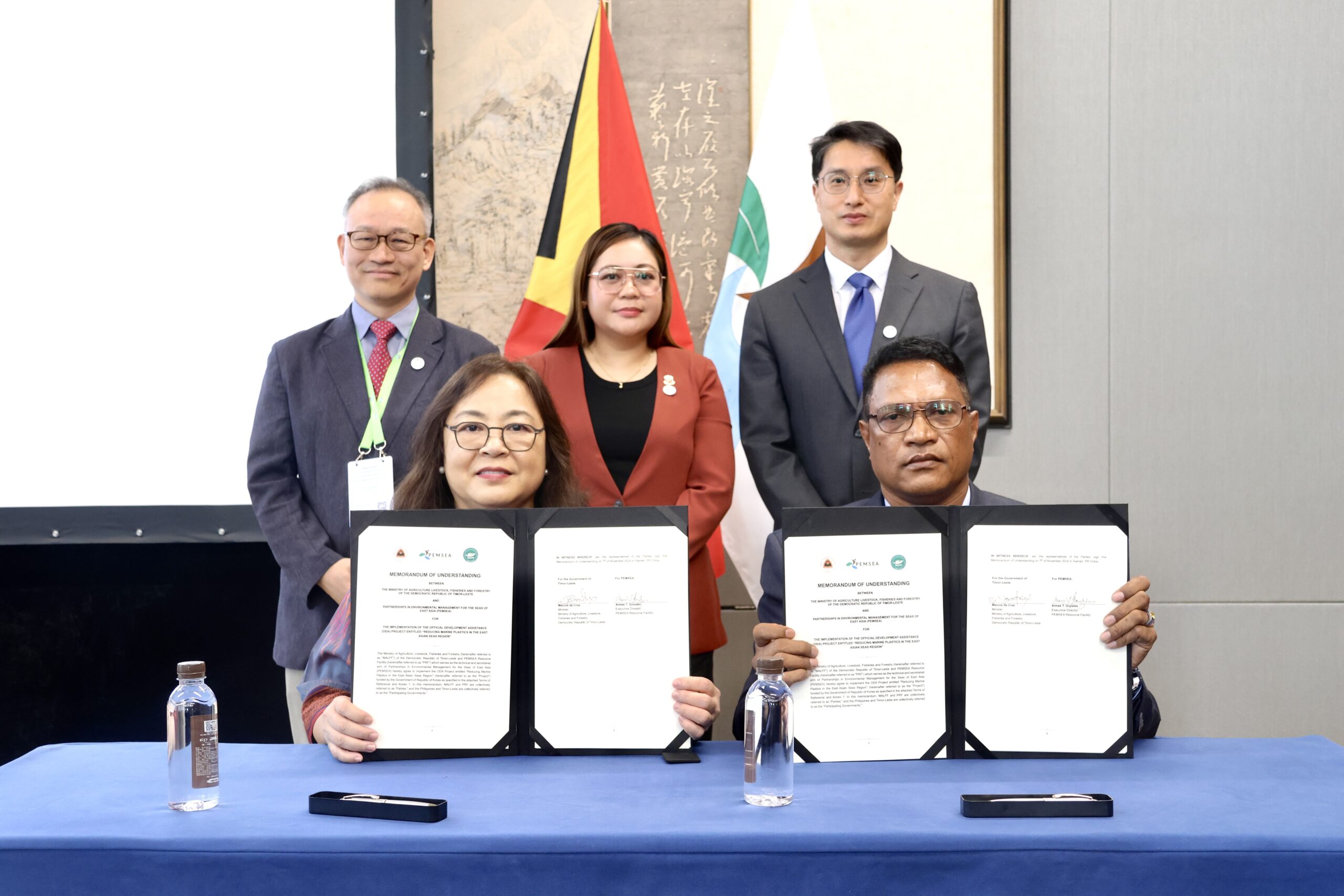ST 2.8 – Marine Plastics ODA Session

The MOU Signing Ceremony between PEMSEA and the Government of Timor-Leste for implementing the ODA Project at Timor-Leste. Ms. Aimee Gonzales, Executive Director of PEMSEA and Hon. Mr. Domingos da C. dos Santos, Secretary of State for Fisheries, Ministry of Agriculture, Livestock, Fisheries and Forestry (MALFF). Timor-Leste signed the MOU. (PRF)
“The ODA Project on Reducing Marine Plastics in the East Asians Seas Region is timely and is a crucial step in mitigating the impacts of marine plastic pollution by promoting sustainable waste management practices, enhancing public awareness and fostering international cooperation in combatting this global problem,” said the Secretary of State of Fisheries Hon. Domingos da C. dos Santos at the ODA Session of the EAS Congress, held on 7 November 2024 at the Xiamen International Conference Center in China and attended by over 50 EAS Congress delegates.
Marine plastic pollution is one of the most urgent environmental threats of our time, with far-reaching impacts on marine ecosystems, biodiversity and human livelihoods. Mismanaged plastic waste enters our oceans, harming marine life, disrupting fisheries and degrading vital coastal habitats.
Addressing the marine plastic pollution issue is critical not only for the health of our oceans but also for the well-being of the coastal communities that depend on them for food, income and cultural practices. During the session, the governments of RO Korea, Philippines and Timor-Leste affirmed their actions toward combating marine plastic pollution through the Marine Plastics ODA Project, at 10 project sites across the Philippines and Timor-Leste.
The Government of Timor-Leste and PEMSEA entered into a Memorandum of Understanding (MOU) to implement the Marine Plastics ODA Project in Timor-Leste, which officially endorses the ODA activities in the country.
As a part of ODA Project activities, the baseline assessment results of the Philippine sites were shared. About 20 – 30% of total wastes are plastic wastes, with around 35% leaked to the environment without proper management. This requires more robust plastic and waste management at the project sites with improved collection, segregation, recycling and upcycling of plastics.
The involvement of local NGOs through the Marine Environment Protector (MEP) Program of the ODA Project is instrumental in mobilizing and educating local stakeholders to enhance awareness on marine plastic pollution. Local governments are committed to support the activities of MEPs at the local sites.
Academic insitutes are conducting quarterly beach monitoring of marine plastics at 10 sites through citizen-science methodology. The data from this year’s monitoring results showed that the quantities are showing decreasing trends over the three monitoring activities. The monitoring will be continued until the end of the project to gauge long-term trends of marine plastic occurrence at the 10 project sites.
The local governments will adopt innovative solutions and best practices currently available around the world for reducing marine plastics including setting-up waste collectors and barriers at river mouths, enhancing collection and segregation using better or correct equipment, improving plastic recycling and upcycling at the Material Recovery Facilities (MRFs), and so forth.
The session aligned perfectly with Action 2 of the Xiamen Ministerial Declaration by considering science-based data and information to support planning, policy development, and investment decision–making, plus measuring the effectiveness of integrated coastal management and expand its scope and linkages to marine spatial planning and other area-based management approaches.
“The Marine Plastics ODA Project is supporting the global commitments for combating marine plastic pollution as advocated by the upcoming Plastic Treaty. The 10 sites of the ODA Project are committed to reduce plastic pollution by 20% by 2028,” concluded Dr. Shin.

The Marine Plastics ODA Session was held on 7 November 2024 at Meeting Room 2A of the Xiamen International Conference Center. It was attended by around 50 participants from the Philippines, RO Korea, Timor-Leste and other countries. (PRF)
